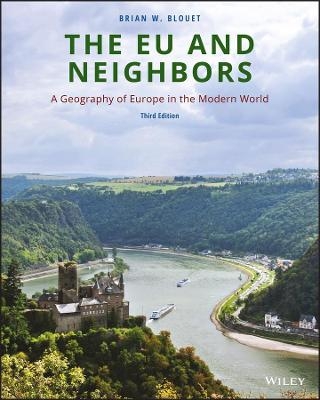
The EU and Neighbors
John Wiley & Sons Inc (Verlag)
978-1-118-79006-9 (ISBN)
Europe is the second-smallest of the continents, yet it is the third most populated—and its rich history has played out on the world's maps for centuries. The region's borders have undergone near-continuous evolution through the rise and fall of nations, rebellions, and civilizations, and the paths these borders take have repercussions around the globe.
This book presents a systematic survey of Europe and individual country-by-country coverage based on the most current data. From the core of the European Union to the lesser-known corners of the continent, this book provides in-depth examination of the physical, cultural, economic, and political geography of this powerful region. Fresh perspective sheds new light on recent events including Brexit, Russia's takeover of Crimea, terrorist attacks in France, and the EU's newest members, while the European Union's future is explored in light of the possible loss of the region's second-largest economy. With deep insight into each nation and its relationship to the region, this book offers a uniquely intimate look at the various dynamics shaping Europe today.
Introduction: The European Union 1
Present Issues 1
The Coal and Steel Community (1951) and the European Economic Community (1957) 2
EFTA: The European Free Trade Association (1960) 2
Enlargement of the European Economic Community (EEC) 2
European Union (1993) 4
Origins of the European Union 4
World War II 4
Western European Defense Needs 5
The Truman Doctrine, The Marshall Plan, and NATO 5
Agreeing on a European Framework 5
The Suez Canal Crisis 6
Jean Monnet 6
The Coal and Steel Community 7
Rome to Maastricht 7
EU Expansion and Expansion Fatigue 9
EU Issues 9
The EU Today 9
A Multicultural EU 10
The European Union and North America 10
Organization of the Text 11
Further Reading 11
Part I Systematic Survey
1 Physical Environments 14
Environmental Concerns 14
A View from Space 14
Climate and Weather 15
The Variability of European Weather 16
General Climate Considerations 17
Natural Vegetation 21
Topography: Mountains, Rivers, and Plains 23
Human Impact on the Environment 28
Further Reading 30
2 Cultural and Historical Geography 31
Introduction 31
A Mosaic of Cultures 32
Languages 32
Religions 40
Culture Contrasts 45
Further Reading 46
3 Population, Distribution, Density, Migration, and Aging 47
Introduction 47
Thomas Robert Malthus 48
Demographic History 48
The Demographic Transition 50
Distribution of Population 55
EU Population Trends 60
Further Reading 63
4 Rural and Urban Settlements 64
Introduction 64
The Network of Roman Towns 66
The Medieval City 66
The Renaissance City 70
The Industrial City 76
Rural Settlement 79
Settlements in the Modern Era 83
Ethnicity in European Cities 90
Summary 92
Further Reading 93
5 Economic Geography: Agriculture, Industry, and Services 94
Introduction 94
Sectors of the Economy 96
Agriculture 97
Industrialization 102
The Stages of European Economic Growth 109
The Impact of the EU on Agriculture, Industry, and Services 113
Human Development Index 115
Further Reading 115
6 Political Geography 116
Friedrich Ratzel 116
Mackinder 116
World War I 116
Ideas for a United Europe 121
Totalitarian Regimes and Economic Autarky 122
The New Order in Europe 125
New European Boundaries after World War II 126
The Cold War 128
Economic Cooperation in Western Europe 129
EU Enlargement (1995) Linked to Soviet Collapse (1991) 135
Widening versus Deepening 138
Summary 140
Further Reading 140
Part II The Core of the European Union
7 France and the Benelux Countries 142
Introduction 142
Belgium 156
The Netherlands 161
Luxembourg 166
Further Reading 168
8 Germany and Italy 169
Introduction 169
Germany 169
Italy 183
Summary 197
Further Reading 198
Part III Enlargement of EU
9 The United Kingdom, Denmark, and Ireland 200
Introduction 200
The United Kingdom 200
Regions of Britain: Scotland, Wales, Northern Ireland, and England 203
A United Kingdom? 219
Denmark 221
Ireland 225
Summary 230
Further Reading 230
10 Southern Europe: Greece, Spain, and Portugal 232
Greece 232
The Iberian Peninsula—Spain and Portugal 240
Further Reading 250
11 Austria, Switzerland, Sweden, Norway, Iceland, and Finland 251
Introduction 251
Austria 251
Switzerland 256
Sweden 263
Norway 268
Iceland 274
Finland 278
Summary 281
Further Reading 281
Part IV Enlargement in the 21st Century
12 Eastward Expansion 2004: The Baltics, Poland, The Czech Republic, Slovakia, Hungary, and Slovenia 284
Introduction 284
The Baltic States: Estonia, Latvia, Lithuania 285
Poland 289
The Czech Republic 296
Slovakia 303
Hungary 305
Slovenia 311
East Europe Summary 312
Further Reading 312
13 Eastward Expansion 2007–2013: The Balkans 314
Introduction: The Balkans 314
Romania 315
Bulgaria 319
Croatia 322
Serbia 324
Montenegro 327
Bosnia-Herzegovina 328
Macedonia 331
Albania 332
Balkan Summary 334
Further Reading 335
Part V Regional Survey: Russia and Former Soviet Socialist Republics
14 Belarus, the Ukraine, Moldova, Georgia, and Russia 338
Introduction 338
Belarus and the Ukraine 338
Moldova 344
Georgia 346
Russia 349
Summary 367
Further Reading 367
Part VI The Mediterranean Fringe
15 Turkey, Cyprus, Malta, and Gibraltar 370
Introduction 370
Turkey 370
Turkey, The Middle East, and Europe 376
Cyprus, Malta, and Gibraltar 377
Cyprus 377
Malta 381
Gibraltar 388
The EU in Africa 391
Islas Canarias 391
Further Reading 392
16 European Union Future? 394
EU External Relations 395
The Common Agricultural Policy in World Affairs 395
Imperial Pasts 396
Decolonization 396
Turkey 396
Summary 397
Glossary 398
Index 404
| Erscheinungsdatum | 21.06.2018 |
|---|---|
| Verlagsort | New York |
| Sprache | englisch |
| Maße | 203 x 252 mm |
| Gewicht | 748 g |
| Themenwelt | Naturwissenschaften ► Geowissenschaften ► Geografie / Kartografie |
| Recht / Steuern ► EU / Internationales Recht | |
| ISBN-10 | 1-118-79006-5 / 1118790065 |
| ISBN-13 | 978-1-118-79006-9 / 9781118790069 |
| Zustand | Neuware |
| Informationen gemäß Produktsicherheitsverordnung (GPSR) | |
| Haben Sie eine Frage zum Produkt? |
aus dem Bereich


